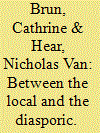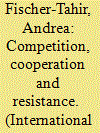|
|
|
Sort Order |
|
|
|
Items / Page
|
|
|
|
|
|
|
| Srl | Item |
| 1 |
ID:
111512


|
|
|
|
|
| Publication |
2012.
|
| Summary/Abstract |
In May 2009, Sri Lankan government armed forces defeated the Liberation Tigers of Tamil Eelam (LTTE) after more than a quarter of a century of civil war. With the elimination of most of the LTTE leadership and the waning of its hold over Tamils in Sri Lanka and abroad, the scene was set for a transformation of relations between the diaspora and those at home. It is the dynamics of this transformation that we explore in this article, which traces the shifting centre of gravity in Tamil politics between actors in the homeland and those in the diaspora. Drawing on Bourdieu's notion of a 'political field', we characterise what we call the local, diasporic and transnational political fields in the Sri Lankan setting. This article shows how the LTTE's power derived largely from its control of the transnational political field, including in places that were otherwise isolated from diasporic connections. The defeat in 2009 fundamentally changed the dynamics of transnational politics by greatly weakening the LTTE's grip over the transnational political field, and this article explores the new dispensation that is now unfolding.
|
|
|
|
|
|
|
|
|
|
|
|
|
|
|
|
| 2 |
ID:
099905


|
|
|
|
|
| Publication |
2010.
|
| Summary/Abstract |
After the fall of Saddam Hussein's regime in April 2003 many women supported the process of transition and became active in political parties and coalitions. A wide range of groups were also formed which pursued women's rights agendas and, in many cases, included a call for peace and reconciliation and charity activities for women and children. However, female political action and the field of women's rights remain divided by the same multiple boundaries of belonging which affect Iraqi society itself; women operate in specific ethnic and denominational, local and regional settings, and they support nationalist, secularist, left-wing or Islamist agendas. Women's rights-whatever the direction-can be of major or minor concern.
This article outlines female political action and draws attention to the key issues which are discussed, in particular, by secular feminists in Iraq. In so doing, the article highlights how women in Iraq have not only lost, as a wide range of observers argue, but have also benefited from the restructure of the political landscape. Female political activists are still faced with old and new social, cultural, legal and political obstacles. The article argues that when women support narratives that leave men's superiority untouched, they are not simply victims of men or 'false consciousness'; women either compete and cooperate, or they reject ideological narratives and power relations, while pursuing agendas of individual interest. Yet, despite competition among women and women's groups, and women's loyalty to agendas controlled by men, radical overtones that resist male domination can be heard- and should be supported.
|
|
|
|
|
|
|
|
|
|
|
|
|
|
|
|
|
|
|
|
|